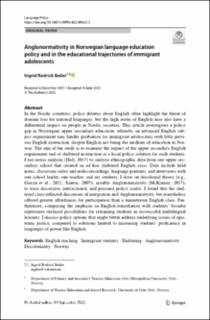| dc.description.abstract | In the Nordic countries, policy debates about English often highlight the threat of domain loss for national languages, but the high status of English may also have a differential impact on people in Nordic societies. This article investigates a policy gap in Norwegian upper secondary education, whereby an advanced English subject requirement may hinder graduation for immigrant adolescents with little previous English instruction, despite English not being the medium of education in Norway. The aim of the study is to examine the impact of the upper secondary English requirement and of sheltered instruction as a local policy solution for such students. I use nexus analysis (Hult, 2015) to analyze ethnographic data from one upper secondary school that created an ad hoc sheltered English class. Data include field notes, classroom video and audio recordings, language portraits, and interviews with one school leader, one teacher, and six students. I draw on decolonial theory (e.g., García et al., 2021; Santos, 2007), notably Anglonormativity (McKinney, 2017), to trace discursive, interactional, and personal policy scales. I found that the sheltered class refected discourses of integration and Anglonormativity, but nonetheless ofered greater afordances for participation than a mainstream English class. Furthermore, comparing the emphasis on English remediation with students’ broader repertoires surfaced possibilities for reframing students as resourceful multilingual learners. I discuss policy options that might better address underlying issues of epistemic justice, compared to solutions limited to increasing students’ profciency in languages of power like English. | en_US |

